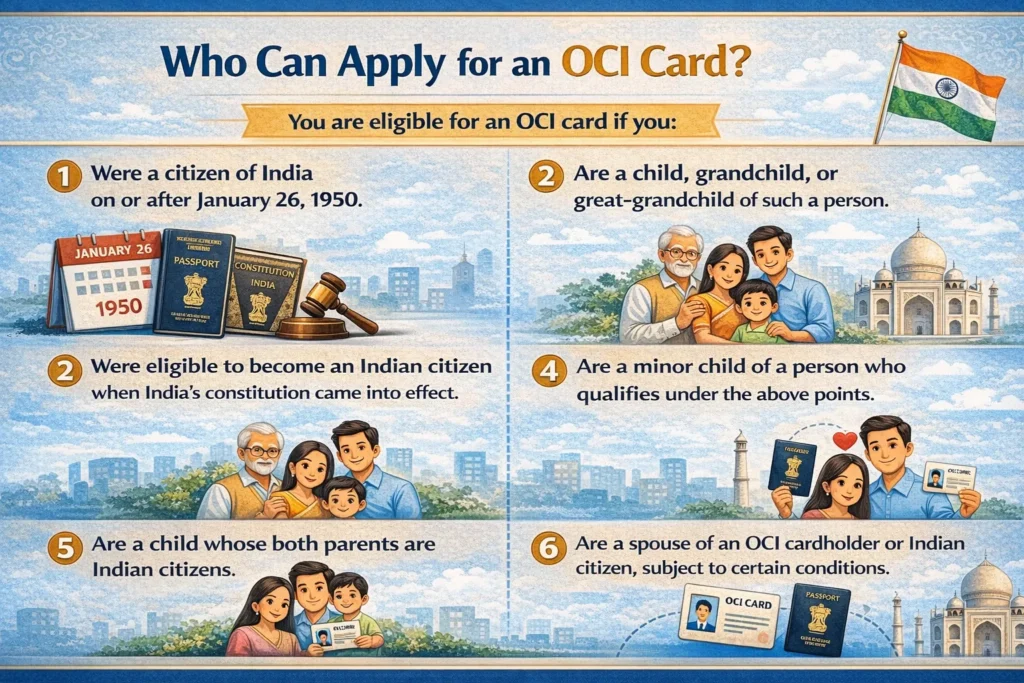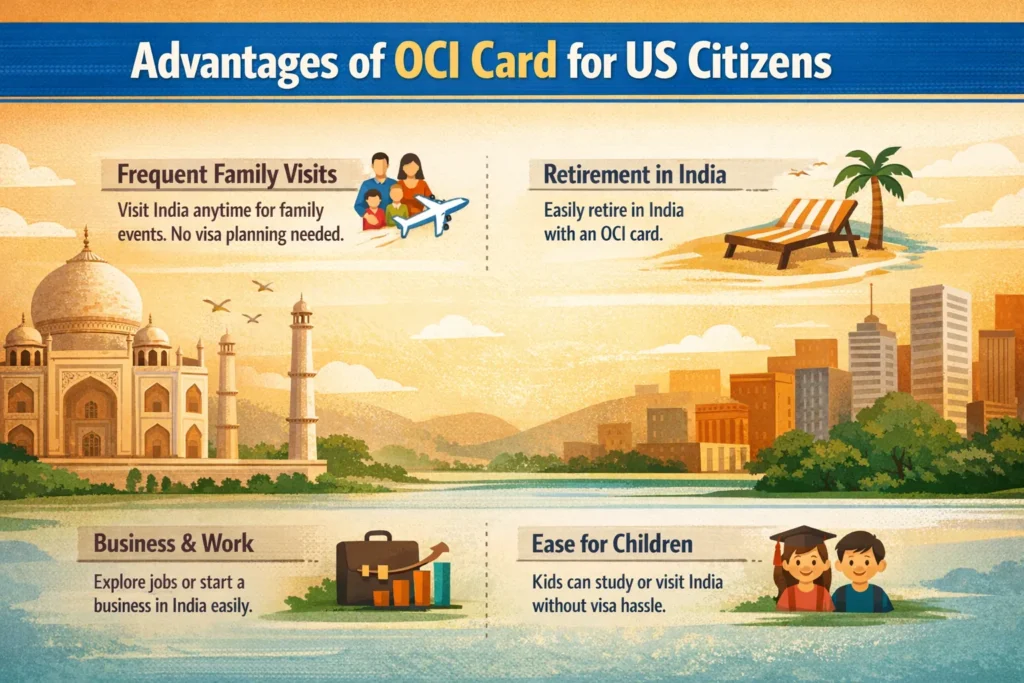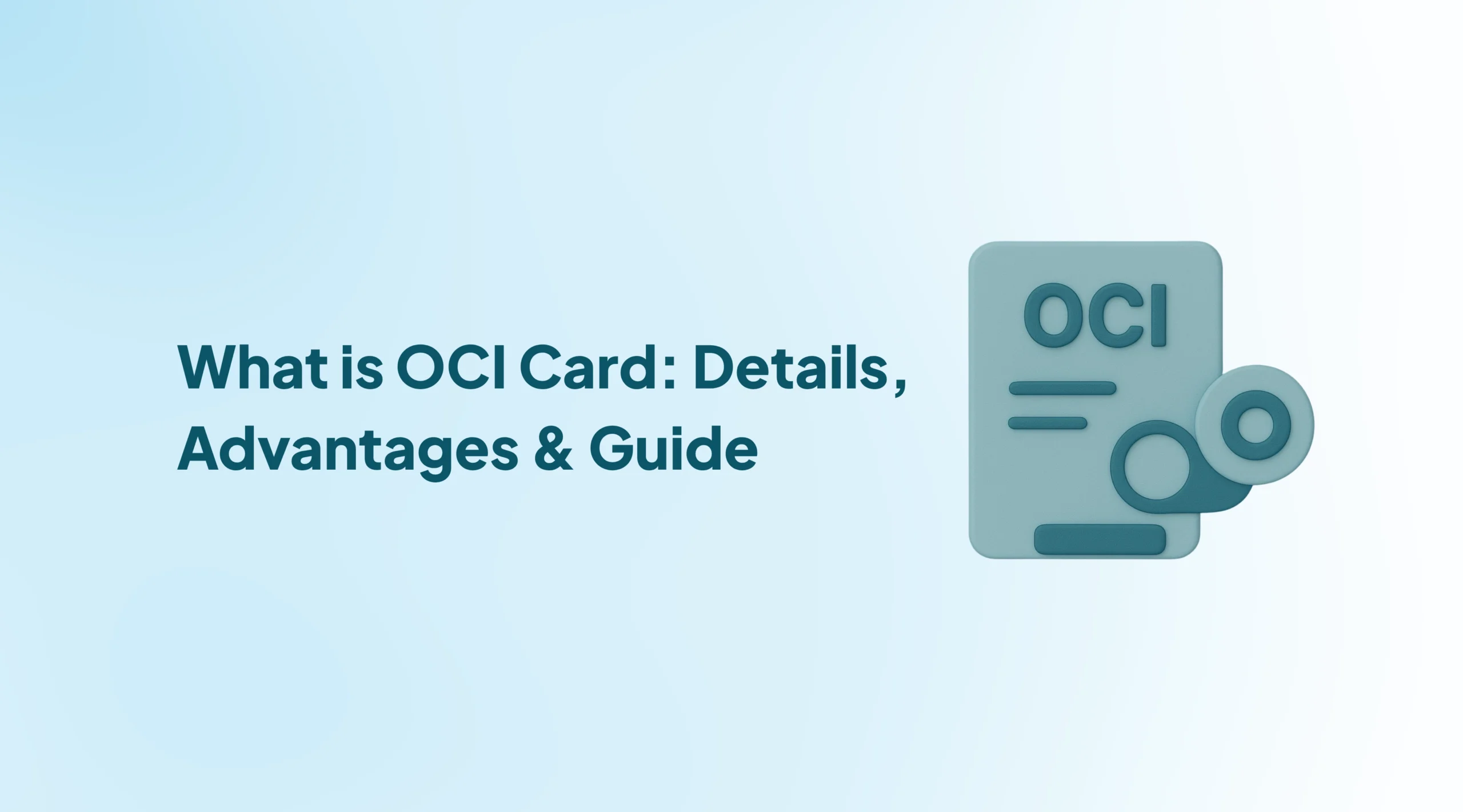Imagine you have deep roots in two different countries. Your family is from India. But you live, work, and have built a life in the United States, Canada, or the UK. Visiting India should feel like going home. But instead, you face visas. You deal with paperwork and time limits. It feels temporary.
What if you had a card that gave you almost all the perks of an Indian citizen? Without giving up your current passport.
That card exists. It is called the OCI card.
This guide will walk you through everything you need to know. We will cover what the OCI card means, its incredible benefits, and who can get one. We will clear up the confusion around OCI, PIO, and Indian citizenship. Let us get started.
OCI Card: Quick Definition
An OCI card, or Overseas Citizenship of India card, is a special immigration status. It allows foreign citizens of Indian origin to live and work in India indefinitely. Think of it as a permanent, multiple-entry visa for people with a connection to India.
It is not a passport. It is not citizenship. But it is the closest thing you can get to Indian citizenship while holding a foreign passport.
Here are the key details at a glance:
- Full Form: Overseas Citizenship of India
- Issued By: The Government of India, Ministry of Home Affairs
- Key Feature: Lifelong visa-free travel to India
The OCI card was introduced to strengthen the bond between India and its massive global diaspora. It is a way for India to say, “You are still one of us.”
OCI vs PIO: Historical Background
To understand the OCI card, you need to know a bit of history. For years, there were two similar schemes. The PIO card and the OCI card. It was confusing.
The PIO card, or Person of Indian Origin card, was launched earlier. It offered many similar benefits. But it had limitations. For example, PIO cardholders still had to register with the police if their stay exceeded 180 days.
Then, in January 2015, the Indian government merged the two programs. The PIO card scheme was absorbed into the OCI card scheme.
This was a huge simplification. All existing PIO cardholders were deemed to be OCI cardholders. If you have an old PIO card, it is still valid. But the government strongly recommends you convert it to an OCI card. The process is straightforward.
Here is a quick comparison of the old PIO card versus the OCI card:
| Feature | PIO Card (Pre-2015) | OCI Card (Current) |
|---|---|---|
| Visa Type | Multiple-entry, 15-year visa | Multiple-entry, lifelong visa |
| Stay Limit | Needed to register after 180 days | No need to register for any length of stay |
| Application | Simpler, but less robust | More thorough, but offers stronger rights |
| Status | No longer issued; can be converted to OCI | The current and standard document |
The merger made life much easier for millions of overseas Indians.
Who Can Apply for an OCI Card?

Not everyone with an Indian connection can get an OCI card. The rules are specific. The program is designed for people who have a direct link to India through birth or ancestry.
You are eligible for an OCI card if you:
- Were a citizen of India on or after January 26, 1950.
- Were eligible to become an Indian citizen when India’s constitution came into effect.
- Are a child, grandchild, or great-grandchild of such a person.
- Are a minor child of a person who qualifies under the above points.
- Are a child whose both parents are Indian citizens.
- Are a spouse of an OCI cardholder or Indian citizen, subject to certain conditions.
The application process is done online through the official OCI Services website. You submit your documents, pay the fees, and then send your passport to a visa center like VFS Global or BLS International for processing.
There are also important restrictions. Citizens of Pakistan and Bangladesh are not eligible for an OCI card, even if they meet the ancestry criteria.
Key Benefits of an OCI Card
This is the most important section. Why would you go through the process of getting an OCI card? The advantages are significant. They make traveling to and living in India incredibly simple.
Here are the core benefits of holding an OCI card:
- Visa-Free Travel: You do not need a visa to travel to India. Ever. You just book your flight, pack your bags, and present your OCI card and foreign passport at immigration.
- Lifelong Stay: You can stay in India for as long as you want. There is no limit. You can come for a week, a year, or the rest of your life. No more visa runs or extensions.
- Work Rights: You can work in India in almost any private sector job. You do not need a separate employment visa. Starting a business, joining a company, or working freelance is all permitted.
- Property Ownership: You have the same rights as an Non-Resident Indian (NRI) to buy property. You can purchase residential and commercial real estate. The only exception is agricultural land, which you generally cannot buy.
- Educational Access: OCI cardholders can study in Indian schools, colleges, and universities. They are treated on par with Indian citizens for admission purposes. This is a huge benefit for families who want their children to experience education in India.
- Financial Freedom: You can open bank accounts, invest in stocks and shares, and manage mutual funds in India. This makes financial planning and managing assets in India much simpler.
The OCI card essentially removes the bureaucratic barrier between you and your life in India.
Limitations of OCI
The OCI card is powerful. But it is not the same as being a full Indian citizen. It is crucial to understand the limitations so you are not caught by surprise.
The main restrictions are:
- No Voting Rights: You cannot vote in Indian elections. This is a political right reserved for full citizens.
- No Government Jobs: You cannot hold a constitutional post like President or Judge. You are also not eligible for most government jobs.
- No Agricultural Land: As mentioned, you cannot purchase farmland. This is a key difference from full citizenship.
- Not Dual Citizenship: This is the biggest point of confusion. India does not allow dual citizenship. The OCI card is a form of permanent residency, not a second passport. You remain a citizen of your current country.
You must always carry your current foreign passport with your OCI card when traveling. The OCI card is linked to your passport number. If you get a new passport, you must get your OCI document re-issued.
OCI Card vs Indian Citizenship vs 10-Year Visa
People often get confused about where the OCI card fits in. How is it different from being an Indian citizen? How is it better than a long-term tourist visa?
This table makes it crystal clear.
| Feature | Indian Citizenship | OCI Card | 10-Year Tourist Visa |
|---|---|---|---|
| Passport | Hold an Indian passport | Hold a foreign passport | Hold a foreign passport |
| Visa Required | No | No | Yes |
| Stay Duration | Unlimited | Unlimited | Limited (e.g., 180 days per visit) |
| Work Rights | Full rights in all jobs | Rights in almost all private jobs | Not permitted |
| Voting Rights | Yes | No | No |
| Property Rights | Full rights, including agricultural land | Most rights, except agricultural land | Restricted |
As you can see, the OCI card sits perfectly in the middle. It offers the core living and working benefits of citizenship without the political rights. It is far superior to a tourist visa for anyone with a genuine, long-term connection to India.
Advantages of OCI Card for US Citizens

If you are a US citizen of Indian origin, the OCI card is a game-changer. I have seen many friends in the US struggle with planning trips to see family. They have to calculate visa expiration dates. They worry about paperwork.
The OCI card eliminates all that.
For a US citizen, the benefits are especially pronounced:
- Frequent Family Visits: Many Indian-origin Americans have family in India. The OCI card lets you visit on a whim. A wedding, a festival, or just a vacation—no visa planning is needed.
- Retirement in India: The cost of living can make India an attractive retirement destination. With an OCI card, you can retire there seamlessly.
- Business and Work Opportunities: India’s economy is booming. The OCI card allows you to easily explore business ventures or take a job with an Indian company without the hurdle of securing an employment visa.
- Ease for Children: If you have children born in the US, they are eligible for an OCI card through you. This allows them to easily study in India or spend summers with grandparents without any visa hassle.
The application process for US citizens is the same. You apply online and then submit your documents at an Indian consulate or through an agency like VFS Global in cities like San Francisco, New York, or Houston.
Key Uses of OCI Card for Overseas Indians
Let us make this practical. How does the OCI card translate into real-life scenarios?
Here are some key uses for overseas Indians:
- Studying in India: An OCI cardholder from the UK can enroll in a medical college in Delhi without needing a student visa.
- Starting a Business: An entrepreneur in Canada can move to Bangalore to start a tech startup. They can manage the company directly without any work permit issues.
- Inheriting Property: If you inherit a house from your parents in India, managing and holding that property is straightforward as an OCI cardholder.
- Frequent Travel for Work: A consultant based in Singapore who has clients in Mumbai can travel back and forth dozens of times a year. No one at immigration will bat an eye.
- NRI Property Purchase: It gives you the confidence to invest in Indian real estate, knowing you have the right to live in that property whenever you want.
The card is a tool that unlocks a lifetime of connection and opportunity.
OCI Card Application Overview
The application process for an OCI card is entirely online. It is designed to be user-friendly, though it requires attention to detail.
Here is a simplified 5-step overview:
- Check Eligibility: First, confirm you meet the eligibility criteria listed earlier in this article.
- Gather Documents: You will need your current passport, proof of Indian origin (like old passports, birth certificates), passport-sized photos, and other supporting documents.
- Online Application: Fill out the application form on the official OCI Services portal. You will upload your documents and pay the fee online.
- Submit Physical Documents: After the online application, you must send your current passport and a printed copy of the application to your designated visa processing center.
- Receive Your Card: Once processed, you will receive your OCI card in the form of a booklet and a visa sticker in your passport.
The entire process can take a few weeks to a couple of months. For a detailed, step-by-step walkthrough of the application, including document checklists and fee breakdowns, check out our complete OCI Application Process Guide.
FAQs on OCI Cards
Here are answers to the most common questions about OCI cards.
What does OCI stand for?
OCI stands for Overseas Citizenship of India.
Is OCI dual citizenship?No. India does not permit dual
citizenship. OCI is a permanent residency status that gives you lifelong visa-free access and other benefits. It is not a form of citizenship.
What is the difference between PIO and OCI?
The PIO card was an older scheme that was merged into the OCI card in 2015. OCI cards offer better benefits, like no requirement to register with police for long stays. All PIO cards are now considered OCI cards, but holders should convert them.
What are the benefits of an OCI card?
The main benefits include a lifelong, multiple-entry visa to India, the right to live and work in India indefinitely, the ability to own property, and access to the Indian educational system.
Can OCI holders buy property?
Yes, OCI holders can buy both residential and commercial property in India. The same rules that apply to NRIs apply to OCI holders. The only key restriction is on purchasing agricultural land.
Do OCI cardholders pay tax in India?
OCI cardholders are taxed in India based on their residential status, not their OCI status. If you live in India for more than 182 days in a financial year, you may become a tax resident and have to pay taxes on your global income. It is a complex area, and we recommend consulting a tax advisor.
Conclusion
The OCI card is more than just a travel document. It is a bridge. It connects the global Indian community to their homeland in a meaningful, practical way.
It offers the freedom to live, work, and study in India without the constant worry of visa deadlines. It recognizes your heritage and gives you tangible rights.
If you are a foreign citizen of Indian origin, getting an OCI card is one of the most important steps you can take to solidify your connection to India. It simplifies your life and opens up a world of possibilities.


0 Comments